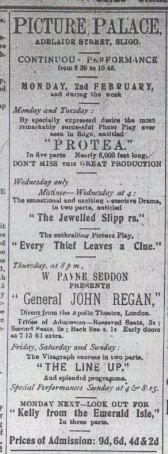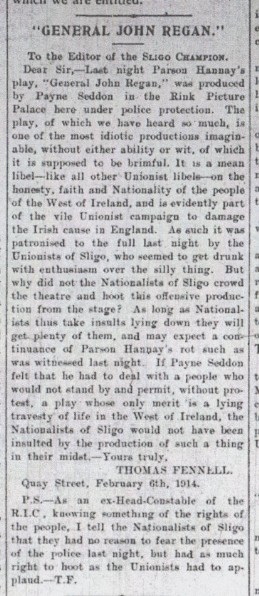John Gillan 4 - Sligo Poets
Main menu:
- Home
-
1912
- 1912
- Sligo Poetry 1912
-
1913
- 1913
- Sligo Poetry 1913
-
1914
- 1914
- Sligo Poetry 1914
-
1915
- 1915
-
Sligo Poetry 1915
- Sligo Newspaper Poems
- Sligo Champion
- Sligo Independent
- Sligo Nationalist
-
1916
- 1916
-
Sligo Poetry 1916
- Sligo Newspaper Poems 1916
- Sligo Champion
- Sligo Nationalist
- Sligo Independent
- The Poets
- Bibliography
- The Author

John Gillan Poems 4 -
Sligo Nationalist 14 February 1914
The Doings in Sligo
(By John Gillan)
(Author “Victoria Line,” “Howl That Fella,” etc., etc., etc., etc.)
I have written on a good many subjects—
Everything nearly I’ve known—
So this week “The Doings in Sligo”
Shall be the name of my poem.
Often at Knox’s Street corner
There’s collected a very big crowd;
Some of these “chaps” no doubt are civil,
And there’s a little gang too, who are proud.
On the streets each night the young newsboys
Cry out in wind, snow, or hail:
“Will you buy the ‘Evening Herald,
‘Telegraph,’ or ‘Evening Mail!’”
At the Market Cross, in this city,
There used to be some time ago
“Trick-
And “thimble-
Also “doctors and “dentists,” who’d feel your pulse
And draw quickly your teeth—
Other “bucks” selling stuff in penny packets
To eat out the corns from your feet.
There are now sold hammers, pincers, and trowels
Big nails, small nails, and screws,
Plum-
That any ould “gubawn” can use.
There’s one baker who has seven bread-
Visiting places afar,
But he’s not “in it” at all with his neighbour
Who has a new bread motor car.
Bergorrah, I “took sthock” one morning,
While round our city it flew,
Driven by that capable cheffeur,
One Mr. Jimmy McH-
To “break up” it never was known to,
And seldom there is a “break down”;
When there’s no “thing” like it in Sligo
“Iv coorse,” it’s the best in the town.
The vehicle must be a great saving—
(As there’s no horse or ass to be fed)—
And it’s “wheeled” round all the towns in this county
Supplying the people with bread!
But talk about these great motors—
How they can “whiff” off so smart—
They’d be “nowhere,” now, for one minute
Beside Andy Gaffney’s “thoroughbred” ass and cart!!!
People that are fond of a warbler
With a nice, wee pretty red bill,
Can get a cock thrush, goldfinch, or linnet,
From Tommy Anderson of Harmony Hill.
Now if you desire enjoyment
I’m certain you will get a treat
If you go to Kilgannon’s lovely pictures,
The Theatre in 3, Thomas Street.
There you’ll see the greatest of films,
With no scoff to our Faith or coun-
Like were performed in our town by “live actors,”
Guarded by the “great” R.I.C.
But only for the Bobbies were present
The Tory “skib-
At Parson Hannay’s stupid production
Beyond in the Adelaide Street “gaff.”


John Gillan's references to day to day details of Sligo life are fascinating. These include the scenes he depicts in "The Doings in Sligo" including his delight at the purchase of a "bread motor car" by a Sligo baker and the mention of the sale of birds by Tommy Anderson of Harmony Hill. Anderson, in the 1911 census, returns himself as a "cripple" and gives his occupation as "bird fancier". He seems to be the only one in the country who claimed that occupation in 1911.
In this poem he especially praises Kilgannon's Picture Theatre in Thomas Street and castigates the rival theatre in Adelaide Street for having put on a show by Church of Ireland clergyman James Owen Hannay, who wrote under the pseudonym George A. Bermingham, during which the audience, Tory “skib-
Then on Wednesday, 4 February 1914, when the play was being performed in Westport, County Mayo,The play had to be stopped during the second act when angry protesters stormed the stage. Stage properties and scenery were destroyed and the theatre badly damaged. Windows were smashed in the hotel accommodating the actors. In the course of the riot five baton charges were made against the crowd and a constable was badly injured. Peace was restored only after the intervention of the parish priest.
Bermingham had been living in Westport and some locals thought they were being caricatured for the amusement of foreign audiences. The play tells the story of an American named Horace Billings who arrives in the quiet town of Ballymoy in the west of lreland in a big motor car to inquire about the great Irish "patriot states-
The play was performed in Sligo on the following night, 6 February, apparently without incident though extra police were on duty. There were no comments in the local newspapers before or after the performance apart from the letter (below) in the Sligo Champion by Thomas Fennell, ex-
Skib-